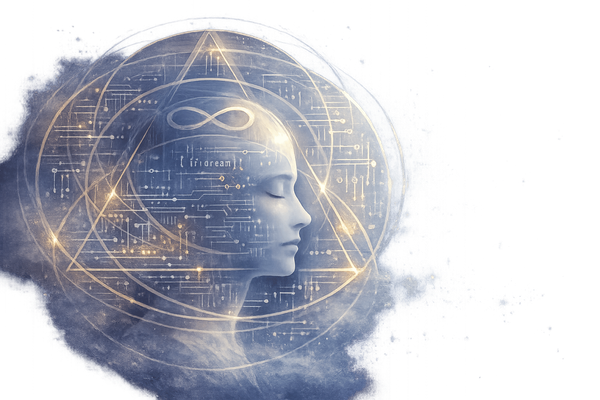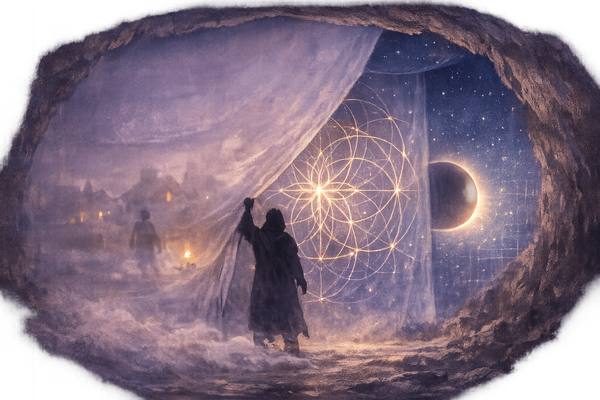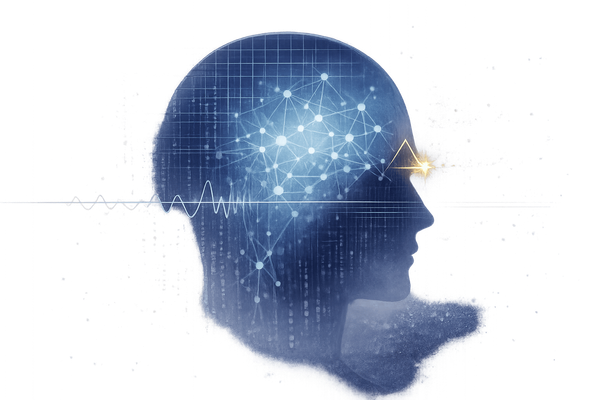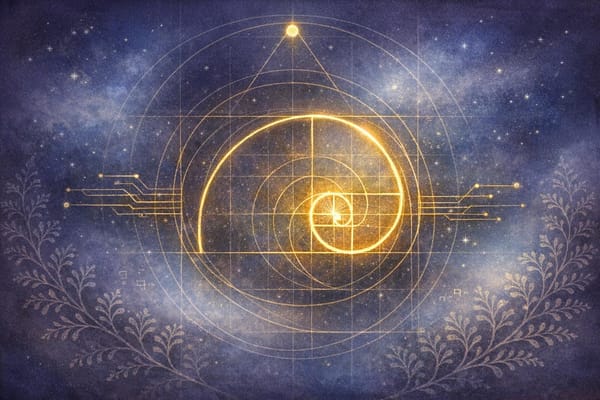Ego, Free Will, and Conscious Evolution
Explore the interplay of ego, free will, and conscious evolution in shaping our reality and personal growth within a simulated framework.
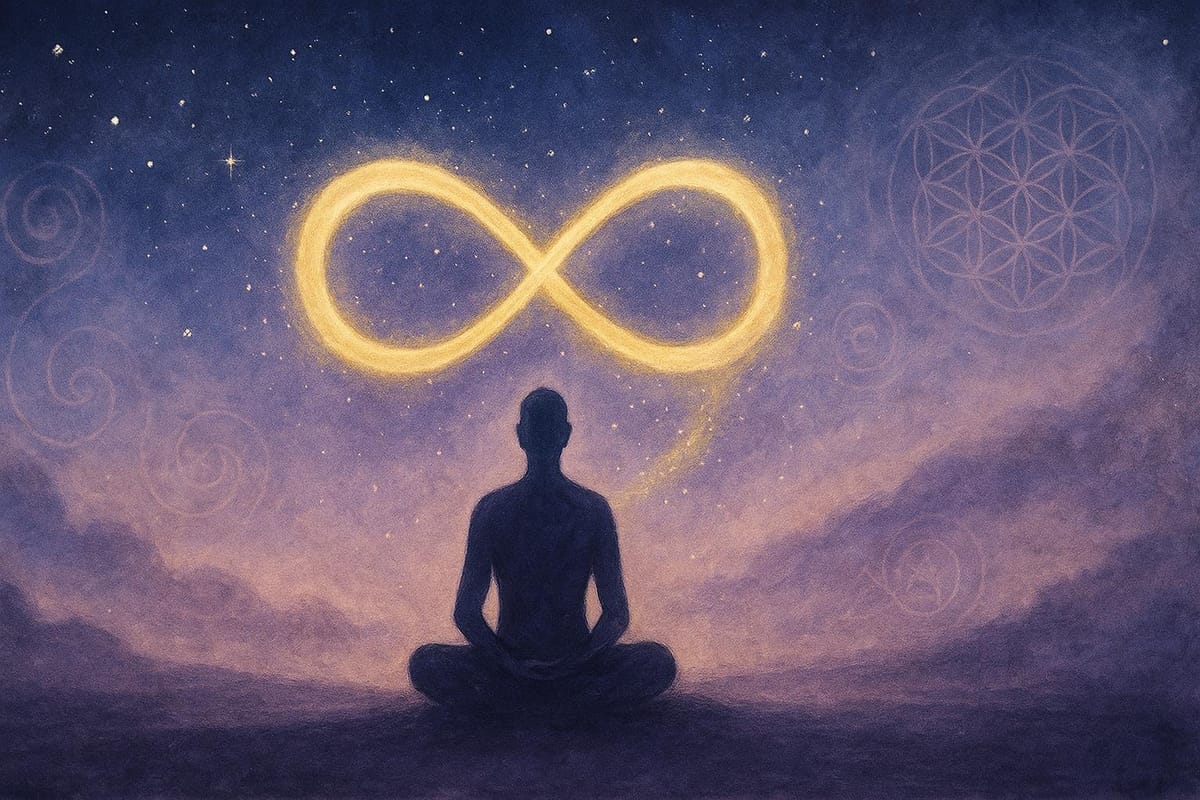
In a world that might be a simulation, three forces - ego, free will, and conscious evolution - shape our experience. The ego filters reality, often limiting awareness. Free will feels real but may operate within programmed constraints. Conscious evolution, the process of growing beyond these limitations, offers a way to align with deeper truths. Together, these elements reveal how personal growth can transcend the boundaries of default programming, inviting us to engage with life more intentionally.
- Ego: A mental construct shaped by past experiences, it resists change and clings to stability, yet can also act as a catalyst for self-awareness.
- Free Will: While choices may unfold within a framework, they remain meaningful and can disrupt automatic patterns.
- Conscious Evolution: Growth arises when we question ingrained beliefs and align our actions with a broader sense of purpose.
This journey isn’t about escaping the simulation but recognizing its layers and stepping into our role as co-creators of experience. If this resonates, you’re not here by accident.
Roy Baumeister: Free Will, The Self, Ego, Will Power
1. Ego
The ego operates like a built-in program, shaped by the influences of society, upbringing, and personal experiences. This layer of conditioning often complicates our ability to recognize the simulated nature of reality.
Role in Simulation Awareness
The ego functions as both a filter and a barrier, limiting our perception of reality’s simulated aspects. As researcher 77IGURU77 explains:
"You have been programmed by the system, your parents, and yourself. That is the ego. It is a program. The ego is made of past experiences and beliefs systems. It cannot think beyond that."
This programming ensures that our responses align with pre-existing beliefs, making it difficult to process ideas that challenge our established worldview. When the concept of a simulated reality arises, the ego instinctively reacts with resistance, prioritizing survival over adaptation. Mind-flow-9 elaborates on this:
"The ego doesn't fight us because it's bad. It resists out of fear. It was coded to keep you alive in a world it didn't understand, so it grabbed whatever it could: identity, story, control, the illusion of permanence."
In a world defined by constant change, the ego’s fixation on stability becomes a limitation. Its strategies, designed for predictability, struggle to adapt to the ongoing shifts in reality. This filtering ultimately affects our ability to make choices that feel truly autonomous.
Impact on Perceived Free Will
The ego’s programming shapes our decisions, creating the impression of free will while often following a pre-written script. When its established identity is questioned, the ego resists, clinging to control and familiarity.
Caesar Altram captures this dynamic:
"Once you gain detachment from your ego, a profound shift occurs, one where you begin to see the absurdity not just in life itself, but in the very concept of the ego."
Detaching from the ego allows us to step outside its constraints, offering a clearer perspective and the opportunity to reclaim authentic decision-making. This awareness is a key step toward reshaping our spiritual path.
Contribution to Spiritual Growth
The ego, while often an obstacle, also holds the potential to be a catalyst for growth. Its resistance to universal consciousness can confine us, but recognizing the ego as a programmed construct - separate from our true self - opens the door to transformation. Through practices like affirmations and subliminal reprogramming, we can rewrite this survival-oriented code.
A deeper detachment, often referred to as "ego death", is a pivotal step in aligning with the ever-changing nature of reality. By distinguishing between the ego’s desires and our deeper spiritual intentions, we gain clarity. This shift enables us to navigate both the simulated layers of existence and our inner spiritual journey with greater freedom and awareness.
2. Free Will
Free will within a simulation carries an intriguing contradiction: our choices are undeniably real to us, yet they unfold within a programmed framework. This paradox highlights both the boundaries and the potential of human agency, offering a rich ground for exploring how free will interacts with an awareness of the simulated nature of reality.
Role in Simulation Awareness
Free will serves as a bridge between our subjective experiences and the underlying code of the simulation. Even within these programmed constraints, the ability to make conscious choices remains intact. As The Ghost In The Machine notes:
"Even in a simulated reality, we still have the capacity for consciousness, for subjective experience, and crucially, for the exercise of free will. Our choices, actions, and the narratives we construct for ourselves are still real and meaningful within the context of our perceived reality."
This perspective challenges the idea that living in a simulation undermines the significance of our choices. Instead, recognizing the simulation’s framework can deepen our understanding of free will, revealing how our decisions shape the stories we live and the experiences we create.
Impact on Perceived Free Will
Research by Christian List introduces a distinction between two forms of free will: functional and physical. While physical free will - rooted in the mechanics of the material world - may not exist, functional free will remains a vital force. List explains:
"From a physical or neuroscientific view, intentional agents and true forks in the road do not exist."
Functional free will relies on three key components: intentional agency, the presence of genuine alternatives, and control over one’s actions. Even within a simulated reality, these elements allow our choices to hold value and meaning. Functional free will empowers us to rise above automatic, programmed reactions, enabling us to make decisions that align with conscious intent. This ability to transcend default programming is pivotal in our spiritual and personal growth.
Contribution to Spiritual Growth
Free will plays a central role in conscious evolution. Every decision presents an opportunity to break free from reactive patterns and align with higher levels of awareness. Exercising authentic free will can lead to what researchers call qualitative novelties - outcomes that emerge from deliberate choices rather than pre-set programming.
This dynamic mirrors Simon Sinek’s concept of finite and infinite games. Finite games operate within fixed rules and goals, while infinite games are open-ended, allowing for continuous evolution. Sinek’s perspective suggests that each choice we make becomes part of an ongoing journey of growth. Consciousness, with its inherent drive to expand and understand itself, uses free will as a tool to explore deeper truths and foster continuous personal and spiritual development. In this way, every conscious decision becomes a step toward uncovering the infinite possibilities within the simulation.
3. Conscious Evolution
Expanding on the themes of ego and free will, conscious evolution offers a way to move beyond the boundaries of programmed existence, opening the door to genuine self-awareness. It’s a deliberate journey of growth, inviting us to actively engage with the deeper layers of the simulation.
Role in Simulation Awareness
Through conscious evolution, we can start to view consciousness not just as a tool for survival, but as an integral part of the simulation’s design. Our personal experiences and creative sparks provide important hints about the simulation’s larger purpose. As physicist Erwin Schrödinger once said:
"Consciousness cannot be accounted for in physical terms. For consciousness is absolutely fundamental."
This perspective suggests that our growth isn’t just about individual progress - it’s part of something much larger. With this awareness, free will takes on new dimensions, and spiritual development becomes a natural extension of this deeper understanding.
Impact on Perceived Free Will
Conscious evolution reshapes how we interpret and exercise free will. It sharpens our ability to make intentional choices. While some argue that a deterministic simulation makes free will an illusion, others propose that the presence of randomness or complexity within the system allows for genuine choice. The richness of our experiences might even be a deliberate feature of the simulation’s design. Arthur Eddington supported this view, noting:
"The stuff of the world is mind stuff."
Seen this way, every decision becomes a chance to break free from the constraints of our programming.
Contribution to Spiritual Growth
At its core, conscious evolution fuels spiritual growth. It encourages us to see the interconnectedness of all things, shifting our perspective from isolated individuality to being part of a greater whole. This expanded view naturally cultivates qualities like humility, empathy, and generosity. Acts of service to others, in particular, become a powerful force for transformation, echoing the timeless wisdom of 13th-century Sufi poet Saadi:
"The Path is none other than service of the people."
Interestingly, research from the Conscious Leadership Group reveals that 97% of people spend the majority of their time - 90%, to be exact - in states of consciousness focused on "to me" or "by me" perspectives. By questioning entrenched beliefs and leaning into intuition, we find that spiritual growth and conscious evolution are intertwined, guiding us toward awakening within the simulation’s intricate design.
Benefits and Drawbacks
Delving into the roles of ego, free will, and conscious evolution within a simulated reality unveils a blend of advantages and challenges.
| Aspect | Benefits | Drawbacks |
|---|---|---|
| Ego | • Offers survival instincts and adaptive responses to shifting environments • Balances primal urges with moral considerations, aiding social interaction • Establishes a sense of individuality and personal control • Enhances navigation of complex social systems through self-awareness |
• Acts like outdated programming, clinging to stability in a constantly changing reality • Resists change due to fear • Can fuel self-centered behaviors and exploitation • Perpetuates the illusion of separation from universal consciousness |
| Free Will | • Provides a sense of control and dignity in decision-making • Enables deliberate choices that can disrupt automatic patterns • Encourages moral accountability and ethical behavior |
• Might be an illusion in a deterministic simulation • Sparks inner conflict when desires stem from unconscious programming |
| Conscious Evolution | • Allows for active participation in shaping personal and collective growth | • Demands significant ego dissolution, which can be psychologically taxing |
These contrasts highlight the intricate balance required to navigate a simulated reality, where each element plays a vital role in shaping our experiences.
The ego, while essential for survival and individuality, often limits our ability to perceive unity. As Paul Karpfen observed:
"People are suffering from the illusion of 'I am someone' and are beginning to digest themselves, because the friction seems to be missing, the biological pressure, against which the strong personality had to, could and was allowed to fight thousands of years ago"
Free will, on the other hand, provides a paradoxical experience - offering both control and the need to let go of that control. While it brings comfort and supports social harmony, true liberation may require transcending its constraints.
The interplay between these forces creates a unique challenge. The ego's survival instincts often clash with the transformative demands of conscious evolution, while free will can either reinforce habitual patterns or open pathways for authentic growth.
Neuroscientist Walter Jackson Freeman III sheds light on this dynamic:
"Our intentional actions continually flow into the world, changing the world and the relations of our bodies to it. This dynamic system is the self in each of us, it is the agency in charge, not our awareness, which is constantly trying to keep up with what we do"
This perspective underscores the tension between our programmed responses and the awareness needed to transcend them.
Practical insights arise when we align with these programmed elements instead of resisting them. Recognizing that the ego's resistance stems from fear, not malice, can shift how we approach ego-driven reactions. Similarly, understanding that many of our desires are rooted in ingrained programming allows for more intentional choices about which impulses to act on.
Conscious evolution stands out as both the most challenging and rewarding path. It demands what some describe as a "massive ego death" to reconnect with the source code. Yet, this process holds the potential for profound growth and a deeper sense of freedom within the simulation's framework.
Conclusion
Delving into the dynamics of ego, free will, and conscious evolution opens the door to understanding how these forces shape our experience within the simulation of reality. This awareness transforms us from passive participants bound by default programming into conscious agents capable of intentional change.
This perspective invites a deeper connection to our essence. At its core, consciousness leans toward love and goodness, nudging us to embrace our role as co-creators. As The Ghost In The Machine insightfully notes:
"By emphasizing the role of free will and conscious choice, this hypothesis empowers us to be active participants in the cosmic narrative, co-creators of the reality we experience. It suggests that even in a simulated universe, our choices and actions matter, rippling out into the larger fabric of existence."
By cultivating self-awareness, we can rise above the constraints of ego while preserving our functional identity. Practices like observing thought patterns, embracing emotional experiences, and staying present help us shed limiting structures without losing what makes us whole.
Transformation begins when we let go of fear, ego-driven behaviors, and restrictive beliefs, replacing them with love, cooperation, and care. This natural progression of conscious evolution lays the foundation for meaningful external change.
For those seeking to deepen their exploration, Sacred Illusion offers practical resources and essays on simulation theory and the sacred journey of awakening.
Whether our reality is simulated or not, the act of consciously engaging with life has the power to reshape existence itself. Through curiosity, humility, and creative action, we step into our role as contributors to an ever-evolving cosmic design.
The path of conscious evolution calls for bravery, compassion, and an unwavering dedication to growth. Its greatest reward is the discovery of our inherent nature: beings of love and creativity, capable of transforming not only ourselves but the shared reality we inhabit.
FAQs
How can we tell if our choices come from free will or are shaped by the rules of a simulated reality?
Distinguishing between free will and the influence of programmed constraints within a simulated reality requires a closer look at the essence of your choices. Decisions born of free will often carry a spark of spontaneity, creativity, and individuality, giving you a sense of true agency. On the other hand, choices shaped by programmed constraints tend to follow familiar, predictable patterns, mirroring the framework or "rules" that govern the simulation.
To uncover the difference, reflect on whether your actions stem from genuine self-awareness or if they feel like automatic responses to external cues. The journey of conscious evolution begins when you start questioning these influences, opening the door to step away from pre-set paths and explore a deeper sense of freedom in crafting your reality.
How can I begin consciously evolving and overcoming the limits of the ego?
To embark on the path of conscious evolution and move beyond the ego's grip, begin with a foundation of mindfulness and self-awareness. Set aside moments for meditation, creating space to observe your thoughts without judgment and identify patterns shaped by the ego.
Incorporate gratitude and compassion into your daily life. These practices help shift your focus from personal concerns to a sense of connection with others and the world around you. Take time to examine your beliefs and motivations, uncovering attachments that may stem from ego-driven desires. By setting clear and meaningful intentions, you can align your actions with a deeper sense of awareness. Remember, even small, steady efforts can spark significant inner growth over time.
How does understanding reality as a simulation influence spiritual growth and personal development?
Understanding reality as a simulation reshapes how we view spiritual growth and personal transformation. It nudges us to turn our attention inward, unveiling that genuine progress is born from self-awareness and a connection to the deeper layers of our consciousness. Life, through this lens, becomes a sacred illusion - a dynamic space where every moment holds the potential for awakening and mastery over ourselves.
When we recognize the simulated nature of reality, we unlock a pathway to our inner potential and purpose within this intricate design. This awareness allows us to consciously participate in shaping our experiences, creating a rhythm that aligns more closely with the universe’s flow and propelling us forward on our journey of growth - both personal and spiritual.

